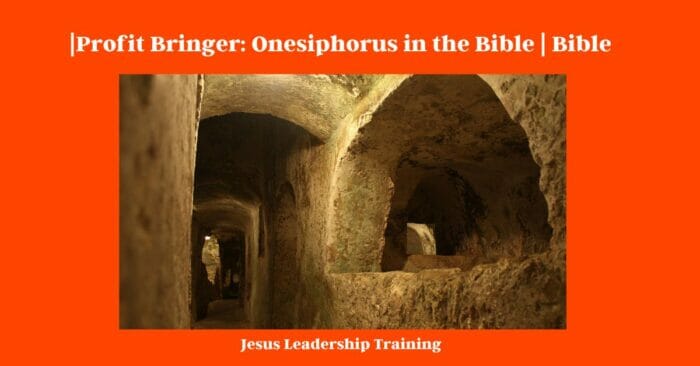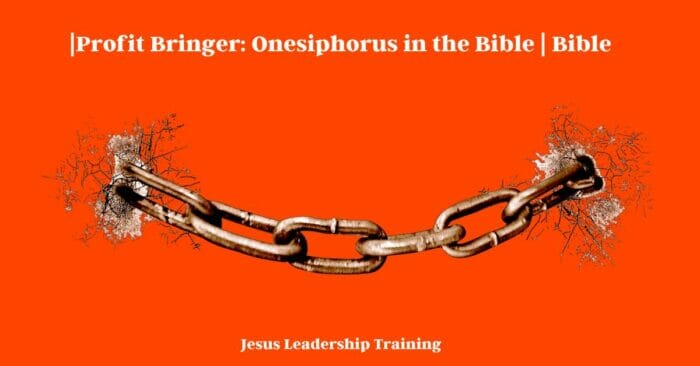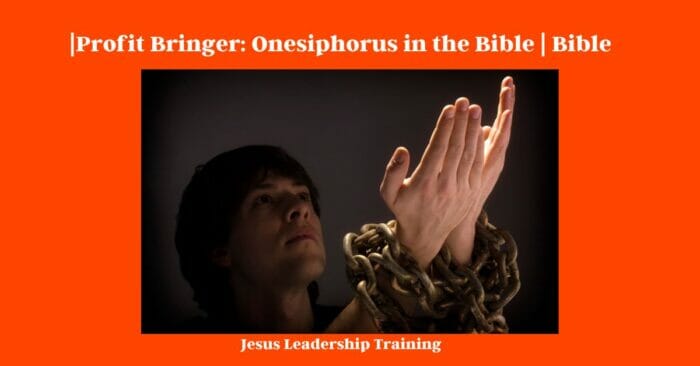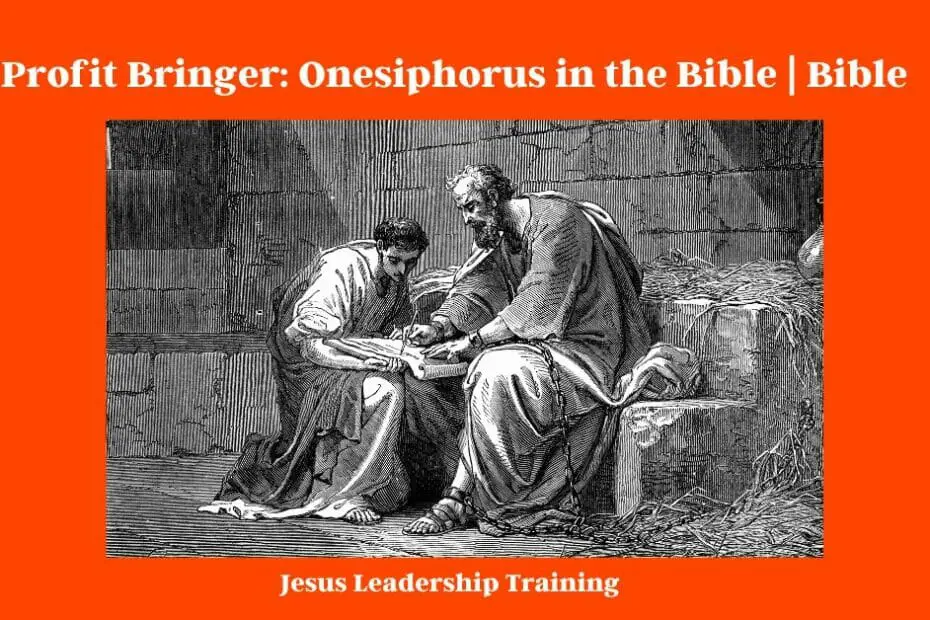Onesiphorus was a Christian who lived in the first century. He was mentioned twice in the bible, and both times he played an important role in helping Paul during difficult times. Onesiphorus is an example of someone who was willing to help others even when it was difficult.
We can learn a lot from his example! Paul asked Lord to grant mercy to the House of Onesiphorus, He was a friend of Paul that showed noble courage to St. Paul in the New Testament letter of second Timothy.
Table of Contents
Onesiphorus in the Bible?
The name Onesiphorus appears only twice in the Bible, both times in the second letter that the apostle Paul wrote to Timothy (2 Timothy 1:16; 4:19). From these two brief mentions, we can learn several important things about this man and his relationship with Paul.
First, Onesiphorus was evidently a loyal friend to Paul, since he went out of his way to search for him during his imprisonment in Rome (2 Timothy 1:16).
Second, Onesiphorus was not afraid to show his support for Paul even though doing so put him at risk of being persecuted by the authorities (2 Timothy 4:16).
Onesiphorus is mentioned briefly in the New Testament, specifically in Paul’s second letter to Timothy. The historical details about Onesiphorus are limited in the Bible, and much of what is traditionally believed about him comes from later Christian traditions and sources. Below is a table that outlines what is known and believed about Onesiphorus:
| Aspect | From the Bible | From Tradition |
|---|---|---|
| Mentions in Scripture | 2 Timothy 1:16-18; 4:19 | Not explicitly mentioned in other parts of Scripture. |
| Relationship with Paul | Paul expresses deep gratitude for Onesiphorus, stating that he often refreshed him and was not ashamed of Paul’s chains. | Tradition holds that Onesiphorus was a steadfast friend and supporter of Paul during his time of persecution. |
| Actions | Searched diligently for Paul in Rome and helped him during his time in Ephesus. | Some traditions suggest he may have provided Paul with resources or protection during his missionary travels. |
| Fate | Not specified in the Bible. | Various traditions: Some say he suffered martyrdom, while others believe he lived out his days in peace. |
| Legacy | Paul prays that the Lord would grant mercy to Onesiphorus’ household because of his kindness and faithfulness. | Recognized as a saint in several Christian traditions. His acts of kindness serve as an example for believers. |
| Feast Day | Not specified in the Bible. | The Orthodox Church commemorates Onesiphorus on September 7th, celebrating his unwavering support of Paul. |
Third, Onesiphorus was clearly a man of faith, as evidenced by his willingness to serve Paul and his proclamation of the gospel. Onesiphorus in the Bible
Fourth, Onesiphorus was apparently a generous man, as he provided financial assistance to Paul during his time of need (2 Timothy 4:17). Ultimately, the life of Onesiphorus serves as an example of loyalty, faithfulness, and generosity that all Christians should aspire to emulate.
He showed Help to Paul during the great risk of persecution. He showed a great profession of the Christian name and paul asked the mercy of the Lord to the family of Onesiphorus in the province of Asia. During the time Paul gave a good answer to Onesiphorus’s kind ministrations. In Prison in Rome families had to provide the daily necessities for the prisoners.
What Does Onesiphorus Mean?
The name Onesiphorus is a Greek name that means “one who brings profit.” The name Onesiphorus (greek spelling) appears only four times in the Bible. Three of those times are in the second Timothy, and the fourth time is in the book of Philemon.
All four times, the context of Onesiphorus refers to a man who was kind to Paul when he was a prisoner. For example, in 2 Timothy 1:16-18, we read that Onesiphorus often refreshed Paul and was not ashamed of his chains.
Similarly, in Philemon 1:7, we read that Onesiphorus was kind enough to visit Paul even though he was in prison. From these passages, we can learn that the name Onesiphorus speaks of someone who is willing to help others even when it’s not easy or convenient. This is an admirable trait and one that we should all strive to emulate.

What Does Church Tradition Teach about Onesiphorus?
There are several things that church tradition teaches us about Onesiphorus.
First, he was a faithful servant of the Lord who was greatly loved by Paul.
Second, he was evidently a wealthy man, as he is said to have provided generously for the needs of the apostle and his companions.
Third, he was likely a prominent member of his local church, as he is said to have exerted a significant influence in promoting the gospel message.
fourth, he was probably martyred for his faith, as he is included among those who suffered for the cause of Christ.
Finally, he is an excellent example of what it means to be a faithful follower of Christ, even in the face of persecution and martyrdom. In conclusion, church tradition provides us with a valuable glimpse into the life and character of a faithful servant of God.
Describe the Christian Persecution During Nero in Rome.
The first wave of Christian persecution was unleashed by Nero in Rome in 64 A.D. when a fire broke out and destroyed a large section of the city. Nero, wishing to deflect blame for the disaster, scapegoated the Christians and had them arrested en mass. Many were tortured and killed, while others were used as human torches to light his garden parties.
This event marked the beginning of nearly 300 years of official persecution of Christians in the Roman Empire. Although sporadic persecutions occurred before this time, they were usually limited to local areas and did not involve the Roman government.
Nero’s persecution, however, was nationwide in scope and endorsed by the emperor himself. As a result, Christians were now forced to choose between renouncing their faith or facing martyrdom.
The bravery of those who refused to give up their beliefs despite the threat of torture and death served as an inspiration to other Christians and helped to spread the faith throughout the Roman Empire. Today, almost 2,000 years later, Christians continue to suffer persecution in many parts of the world. But just as their predecessors did centuries ago, they remain steadfast in their belief that God is with them, even in the darkest of times.

Who was Nero in Rome?
Nero was the last emperor of the Julio-Claudian dynasty. He reigned from 54 to 68AD. Nero was probably born in December 37AD in Antium (now Anzio, Italy). His father was Gnaeus Domitius Ahenobarbus and his mother was Agrippina the Younger. He had an elder sister, Claudia, and a younger brother, Britannicus.
Nero became emperor at the age of 17 after the death of his uncle Claudius. In 64 AD most of Rome was destroyed in a great fire. Rumors spread that Nero had started the fire so that he could build a new palace. To stop people from blaming him, Nero accused some Christians of starting the fire.
The Christians were then savagely persecuted. Many were put to death in cruel ways, such as being covered in pitch and set on fire to light Nero’s gardens at night. In 68 AD Nero faced a series of revolts, the last one led by his own generals. Facing certain defeat, Nero committed suicide on June 9th 68AD. He was the first Roman emperor to do this.
What were Prisons like in Rome during Nero’s Rule?
Prisons in Rome during Nero’s rule were not places of rehabilitation, but rather of torture and death. The prisons were overcrowded and filthy, and the inmates were treated with great brutality. Many prisoners were held in chains, and others were forced to work as slaves in the mines or on the galley ships.
There was little food or water, and conditions were so bad that many prisoners died from disease or starvation. Those who were not killed outright were often tortured to death.
Many prisoners were burned alive or crucified, while others were thrown to the lions or made to fight as gladiators. Inmates who refused to cooperate with their captors could expect to receive even harsher treatment. Nero was known for his sadistic cruelty, and he took pleasure in torturing and killing prisoners. As a result, prisons during his reign were places of terror and despair.
What is Onesiphorus and his role in the Bible for Paul?
What can we learn from Onesiphorus in the Bible? First, he was a devout follower of Christ who was not afraid to show his faith publicly. He was also a man of ACTION – he didn’t just talk about his faith, he lived it out by pursuing Paul and ministering to him in prison.
Finally, Onesiphorus was an encourager and a friend to Paul in a time when he needed it most. He didn’t shy away from Paul when he was facing difficult circumstances but instead showed him compassion and love. As Christians, we can learn from Onesiphorus to be unashamed of our faith, to take action in living it out, and to encourage and love others even when they are going through tough times.
During this particular time, Paul asked him to Salute Prisca and expressed terms of grateful love for members of the family.
He probably was in personal danger in expressing kind gestures to paul from the church leaders. The active Christians shared great sufferings. He was a faithful friend of the apostle Paul and showed great kindness to the Christians of the church.
We Find his warm interest recorded in the holy bible, as many Christians through time have done Bible Study.

What was the Ephesian church and its connection to Onesiphorus?
The Ephesian church was founded by the apostle Paul around AD 53. In his letter to the Ephesians, Paul mentions Onesiphorus several times, praising him for his faithfulness and hospitality. It is likely that Onesiphorus was a member of the Ephesian church, and he may have even been one of its leaders.
He is certainly an important figure in the early history of the church. The Ephesian church was known for its love and devotion to God, and Onesiphorus played a key role in fostering that spiritual atmosphere. He regularly opened his home to fellow believers, providing a place for them to gather and worship together.
He also showed personal concern for each member of the church, ensuring that they had what they needed both physically and spiritually. Because of Onesiphorus’s faithful example, the Ephesian church flourished in its early years.
Etymology of the Biblical Word Onesiphorus
The etymology of the biblical word “Onesiphorus” is connected to both Hebrew and Greek. In Hebrew, the word “Onesiphorus” is derived from the root words “Ones” (meaning “first”) and “phoros” (meaning “bringer”). Together, these two words form the meaning of “first-bringer” or “forerunner”.
The Hebrew term “Onesiphorus” was then adopted by the Greek language, where it was adapted to the Greek “Onesiphorus”. This term was used in the Septuagint, a Greek translation of the Hebrew Bible. In the Septuagint, the term “Onesiphorus” is used to refer to a person who brings good news, or a messenger of hope.
The Aramaic language also has its own version of the term “Onesiphorus”. In Aramaic, the word “Onesiphorus” is derived from the root words “Ones” (meaning “first”) and “pharos” (meaning “light”). Together, these two words form the meaning of “first light” or “forerunner of light”.
The biblical term “Onesiphorus” has a range of meanings, but it is primarily used to refer to someone who is a messenger of hope and brings good news. This term is derived from both Hebrew and Greek, and it has been adapted to the Aramaic language as well.
List of Bible verses about Onesiphorus
The Bible has much to say about Onesiphorus. This individual is commended for their faithfulness and loyalty, even in the face of trials and persecution. Here are just a few of the biblical references to this inspiring figure:
“The Lord grant mercy unto the house of Onesiphorus; for he oft refreshed me, and was not ashamed of my chain:” – 2 Timothy 1:16
“By whom also we have received grace and apostleship, for obedience to the faith among all nations, for his name:” – Romans 1:5
“I thank my God, making mention of thee always in my prayers,” – 2 Timothy 1:3
As we can see, Onesiphorus was a person of great character who was committed to serving God, even in difficult circumstances. May we all strive to be like Onesiphorus in our own lives!
How does Tradition suggest Onesiphorus Died?
Though the Bible does not say how Onesiphorus died, Church tradition has several suggestions. According to one tradition, he was martyred in Rome during the persecution of Christians under Emperor Nero. Another tradition holds that he was put to death in Ephesus during the persecution under Emperor Domitian.
A third tradition claims that he lived to a ripe old age and died peacefully in his sleep. While we cannot know for certain how Onesiphorus died, we can be sure that he remained faithful to the end. As Scripture says, “He is faithful and will never leave you alone.” (2 Timothy 4:7) Whatever the circumstances of his death, we can be confident that Onesiphorus is now rejoicing in the presence of God.
Final Thoughts – Who Was Onesiphorus in the Bible
in conclusion, Onesiphorus was a man of great faith who was not afraid to show his love for Christ. He was also a man of action, living out his faith in practical ways.
Finally, Onesiphorus was an encourager and friend to Paul during a difficult time in his life. As Christians, we can learn from Onesiphorus to be unashamed of our faith, to take action in living it out, and to encourage and love others even when they are going through tough times. Onesiphorus is a great example for us all!
God Bless Greg




